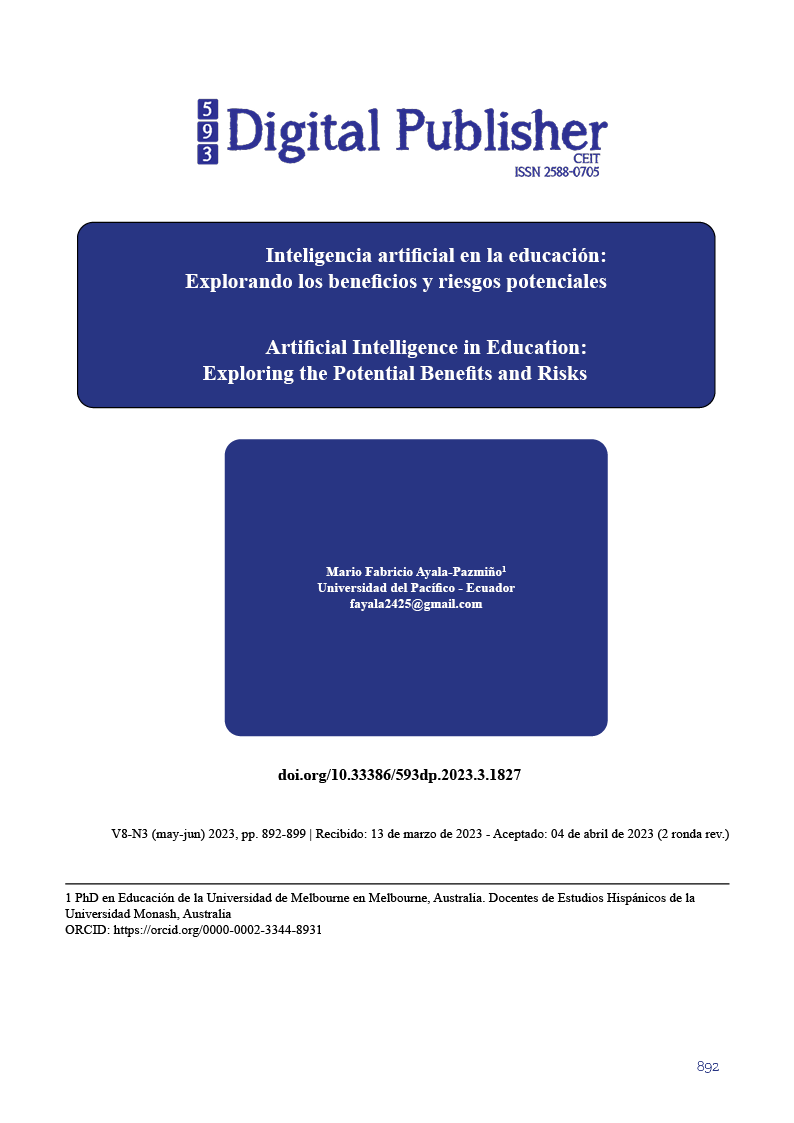Artificial Intelligence in Education: Exploring the Potential Benefits and Risks
Main Article Content
Abstract
Artificial intelligence (AI) can transform education by improving teaching and learning outcomes. However, as with any new technology, there are also risks associated with its use. This paper explores AI's potential benefits and risks in education, including personalized learning, improved assessment, reduced planning time for teachers, and the risk of cheating. Drawing on various studies and perspectives, the paper argues that while AI has specific risks, its educational benefits are significant. The paper concludes by suggesting the need for more empirical research on the impact of AI in education and the importance of preparing students for a future where machines will play a leading role.
Downloads
Article Details

This work is licensed under a Creative Commons Attribution-NonCommercial-ShareAlike 4.0 International License.
1. Derechos de autor
Las obras que se publican en 593 Digital Publisher CEIT están sujetas a los siguientes términos:
1.1. 593 Digital Publisher CEIT, conserva los derechos patrimoniales (copyright) de las obras publicadas, favorece y permite la reutilización de las mismas bajo la licencia Licencia Creative Commons 4.0 de Reconocimiento-NoComercial-CompartirIgual 4.0, por lo cual se pueden copiar, usar, difundir, transmitir y exponer públicamente, siempre que:
1.1.a. Se cite la autoría y fuente original de su publicación (revista, editorial, URL).
1.1.b. No se usen para fines comerciales u onerosos.
1.1.c. Se mencione la existencia y especificaciones de esta licencia de uso.
References
Baker, R., & Siemens, G. (2014). Educational data mining and learning analytics. Handbook of educational psychology, 2, 507-524.
Brackett, M. A., Rivers, S. E., Reyes, M. R., & Salovey, P. (2019). Enhancing educational opportunities by integrating social–emotional learning (SEL) into education policy and practice. Educational Psychologist, 54(4), 274-293. doi: 10.1080/00461520.2019.1632057
Gee, J. P. (2018). What video games have to teach us about learning and literacy. Palgrave Macmillan.
Hattie, J. (2012). Visible learning for teachers: Maximizing impact on learning. Routledge.
Kavale, K. A., & Forness, S. R. (2019). Cheating and plagiarism in schools and colleges. Psychology Press.
Kelleher, C., & Tierney, B. (2018). Artificial intelligence in education: Applications and prospects. AI Magazine, 39(3), 45-49.
Kim, J., Park, H., Jo, I., & Choi, H. (2019). Designing augmented reality simulation for science education: Affordances and constraints. Education Sciences, 9(4), 318.
Kulkarni, C., Cambre, J., Kotturi, Y., Bernstein, M. S., & Klemmer, S. R. (2015). Peer and self assessment in massive online classes. ACM Transactions on Computer-Human Interaction (TOCHI), 22(2), 1-30.
Liao, Y., Huang, R., Sun, C., & Li, X. (2021). Artificial intelligence in education: Opportunities and challenges from a learning science perspective. Frontiers in Education, 6, 1-7.
López-Pérez, M.V., Pérez-Rodríguez, M.A., & Gutiérrez-Santiuste, E. (2020). Artificial intelligence in education: A review. Frontiers in Psychology, 11, 135. doi: 10.3389/fpsyg.2020.00135
Mandernach, B. J. (2018). Effective grading practices in the online classroom: A faculty perspective. Journal of Educators Online, 15(1), 1-22.
Mather, R., & Yau, J. Y. (2019). Artificial intelligence education: Implications for teaching and learning. Educational Research Review, 27, 233-247. https://doi.org/10.1016/j.edurev.2019.03.003
National Education Association. (2020). Preparing educators for AI. https://www.nea.org/resource-library/preparing-educators-ai
Pardo-Ballester, C., Tomás, D., & López-López, M. C. (2021). Exploring the potential of chatbots in foreign language learning: a systematic review. Computer Assisted Language Learning, 34(2), 153-182.
Pellegrino, J. W., & Hilton, M. L. (2013). Education for life and work: Developing transferable knowledge and skills in the 21st century. National Academies Press.
Roorda, D. L., Koomen, H. M. Y., Spilt, J. L., & Oort, F. J. (2011). The influence of affective teacher–student relationships on students' school engagement and achievement: A meta-analytic approach. Review of Educational Research, 81(4), 493-529. https://doi.org/10.3102/0034654311421793
Sclater, N., & Peasgood, A. (2018). Artificial intelligence in education: Promises and implications for teaching and learning. British Journal of Educational Technology, 49(4), 745-760. doi: 10.1111/bjet.12638
Sulik, M. J., Huerta, M., & Ziegler, J. C. (2017). The development of handwriting speed and legibility in grades 1-9. Journal of educational psychology, 109(6), 800-813.
World Economic Forum. (2018). The Future of Jobs Report 2018. Retrieved from https://www.weforum.org/reports/the-future-of-jobs-report-2018.


